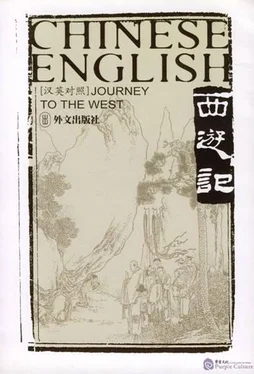At the dragon assembly in the thirteenth year of Zhen Guan
The Emperor called a great meeting to talk about the scriptures.
At the assembly they began to expound the unfathomable law,
While clouds glowed above the great shrine.
The Emperor in his grace orders the building of a temple;
The Golden Cicada sheds his skin to edify the West.
He spreads the news that rewards for goodness save from ill,
Preaching the doctrine of the three Buddhas of past and future.
In the year jisi, the thirteenth of Zhen Guan, on the day jiaxu, the third of the ninth month, the Hierarch Chen Xuanzang assembled twelve hundred venerable monks at the Huasheng Temple in the city of Chang'an for a chanting of all the holy scriptures. After morning court was over the Emperor left the throne hall in his dragon and phoenix chariot at the head of a host of civil and military officials and went to the temple to burn incense. What did the imperial chariot look like? Indeed
Propitious vapours filled the sky
That shone with ten thousand beams of sacred light.
A mellow breeze blew softly,
The sunlight was strangely beautiful.
A thousand officials with jade at their belts walked in due order.
The banners of the five guards are drawn up on either side.
Holding golden gourds,
Wielding battle-axes,
They stand in pairs;
Lamps of purple gauze,
Imperial censers,
Make majestic clouds.
Dragons fly and phoenixes dance,
Ospreys and eagles soar.
True is the enlightened Son of Heaven,
Good are his just and loyal ministers.
This age of prosperity surpasses the time of Shun and Yu;
The eternal peace he has given outdoes that of Yao and Tang.
Under a parasol with curved handle
The dragon robe sweeps in,
Dazzling bright.
Interlocking jade rings,
Coloured phoenix fans,
Shimmer with a magic glow.
Pearl crowns and belts of jade,
Gold seals on purple cords.
A thousand regiments of soldiers protect the imperial chariot,
Two lines of generals carry the royal chair.
Bathed and reverent, the Emperor comes to worship the Buddha,
Submitting to the True Achievement as he joyfully burns incense.
When the carriage of the Tang Emperor reached the temple, orders were given to stop the music as he descended from the vehicle and went at the head of his officials to bow to the Buddha and burn incense. When he had done this three times he looked up and saw what a magnificent assembly it was:
Dancing banners,
Flying canopies.
When the banners danced
The sky shook with the clouds of silk;
When the canopies flew
The sun gleamed as the red lightning flashed.
Perfect the image of the statue of the Honoured One,
Mighty the grandeur of the Arhats' countenances.
Magic flowers in a vase,
Censers burning sandalwood and laka.
As the fairy flowers stand in vases
Trees like brocade fill the temple with their brightness.
As the censers burn sandalwood and laka
Clouds of incense rise to the azure heaven.
Fresh fruit of the season is piled in vermilion dishes,
Exotic sweets are heaped on the silk-covered tables.
Serried ranks of holy monks intone the surras
To save abandoned souls from suffering.
Taizong and his civil and military officials all burned incense, bowed to the golden body of the Lord Buddha, and paid their respects to the Arhats. The Hierarch Chen Xuanzang then led all the monks to bow to the Emperor, and when this was over they divided into their groups and went to their meditation places while the Hierarch showed the Emperor the notice about the delivery of the lonely ghosts. It read:
“Mysterious is the ultimate virtue, and the Sect of Meditation leads to Nirvana. The purity of the truth is all-knowing; it pervades the Three Regions of the universe. Through its countless changes it controls the Negative and Positive; unbounded are the embodiments of the eternal reality. In considering those forlorn ghosts one should be deeply distressed. At the sacred command of Taizong we have assembled some chosen monks for meditation and preaching. He has opened wide the gates of enlightenment and rowed far the boat of mercy, saving all the beings in the sea of suffering, and delivering those who had long been afflicted by the six ways of existence. They will be led back to the right road and revel in the great chaos; in action and in passivity they will be at one with primal simplicity. For this wonderful cause they are invited to see the purple gates of the pure capital, and through our assembly they will escape from the confines of Hell to climb to the World of Bliss and be free, wandering as they please in the Paradise of the West. As the poem goes:
A burner of incense of longevity,
A few spells to achieve rebirth.
The infinite Law is proclaimed,
The boundless mercy of Heaven is shown.
When sins are all washed away,
The neglected souls leave Hell.
We pray to protect our country;
May it stay at peace and be blessed.”
When he had read this the Tang Emperor's heart was filled with happiness and he said to the monks, “Hold firm to your sincerity and never allow yourselves a moment's slackness in the service of the Buddha. Later on, when the Assembly is over, you will be blessed and we shall richly reward you. You shall certainly not have labored in vain.” The twelve hundred monks all kowtowed to thank him. When the three vegetarian meals for the day were over the Tang Emperor went back to the palace. He was invited to come back to the Grand Assembly to burn incense once more on the seventh day. As evening was now drawing in all the officials went away. It was a fine evening:
A light glow suffused the boundless sky;
A few crows were late in finding their roosts.
Lamps were lit throughout the city as all fell still;
It was just the hour for the monks to enter the trance.
We will omit a description of the night or of how the monks intoned the scriptures when their master took his seat again the next morning.
The Bodhisattva Guanyin from Potaraka Island in the Southern Sea had been long in Chang'an, looking on the Buddha's orders for the man to fetch the scriptures, but she had not yet found anyone really virtuous. Then she heard that Taizong was propagating the True Achievement and selecting venerable monks for a Grand Assembly, and when she saw that the Master of Ceremonies was the monk Jiangliu who was really a Buddha's son came down from the realms of supreme bliss, an elder whom she herself had led into his earthly mother's womb, she was very pleased. She took her disciple Moksa and the treasures that the Buddha had given her out on the street to offer them for sale.
Do you know what these treasures were? There was a precious brocade cassock and-a monastic staff with nine rings. She also had those three golden bands, but she put them away safely for future use; she was only selling the cassock and the staff.
There was a monk in Chang'an city too stupid to be chosen for the service but who nonetheless had some ill-gotten banknotes. When he saw the bald, scabby, barefoot figure wearing a tattered robe-the form the Bodhisattva had taken-offering the cassock of dazzling beauty for sale he went up and asked, “How much d'you want for that cassock, Scabby?”
“The price of the cassock is five thousand ounces of silver and the staff two thousand,” replied the Bodhisattva. The stupid monk roared with laughter.
“You must be a nutcase, Scabby, or else a dope. Those two lousy things wouldn't be worth that much unless they gave you immortality and turned you into a Buddha. No deal. Take'em away.”
Not bothering to argue, the Bodhisattva walked on with Moksa. After they had been going for quite a long time they found themselves in front of the Donghua Gate of the palace, where the minister Xiao Yu happened to be returning home from morning court. Ignoring the crowd of lictors who were shouting to everyone to get out of the way, the Bodhisattva calmly went into the middle of the road with the cassock in her hands and headed straight for the minister. When the minister reined in his horse to look he saw the cassock gleaming richly and sent an attendant to ask its price.
Читать дальше









